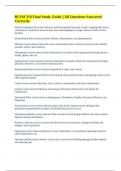BUSM 310 Final Study Guide || All Questions Answered
Correctly.
What do managers do? correct answers switch frequently from task to task, changing their focus
of attention to respond to issues as they arise, and engaging in a large volume of tasks of short
duration
Informational Roles correct answers Monitor, Disseminator, and Spokesperson
Monitor correct answers Seek and receive information from a variety of sources (web, industry
journals, reports, and contacts).
Disseminator correct answers Pass information on to others in the organization through memos,
emails, phone calls, etc.
Spokesperson correct answers transmit information to people outside the organizations through
speeches, interviews, and written communication.
Interpersonal Roles correct answers Figurehead, Leader, and Liaison
Figurehead correct answers Perform formal duties like greeting visitors and signing contracts and
other legal documents.
Leader correct answers Motivate, train, counsel, communicate, and direct subordinates.
Liaison correct answers Maintain and manage information links inside and outside the
organization.
Decisional Roles correct answers Entrepreneur, Disturbance Handler, Resource Allocator, and
Negotiator
Entrepreneur correct answers Initiate projects that lead to improvements; delegate idea-
generation responsibilities to others and identify best ideas to act on.
Disturbance Handler correct answers Take corrective action during conflicts and crises; resolve
disputes among subordinates.
Resource Allocator correct answers Decide who receives resources, manage schedules and
budgets, and set priorities.
Negotiator correct answers Represent a team, department, or organization regarding contracts,
union negotiations, etc.
Decision-making correct answers is the action or process of thinking through possible options
and selecting one.
, Deciding When to Decide correct answers Effective managers must decide when they have
gathered enough information and must be prepared to change course if additional information
becomes available that makes it clear that the original decision was a poor one. For
What's the Right (Correct) Answer? correct answers Sometimes a manager is choosing between
multiple good options, and it's not clear which will be the best. Other times there are multiple
bad options, and the task is to minimize harm.
What's the Right (Ethical) Answer? correct answers It is important to be mindful about whether
our decisions have a positive or a negative impact.
Bounded Rationality correct answers is the idea that for complex issues we cannot be completely
rational because we cannot fully grasp all the possible alternatives, nor can we understand all the
implications of every possible alternative.
Escalation of Commitment correct answers is the tendency of decision makers to remain
committed to poor decision, even when doing so leads to increasingly negative outcomes.
Time Constraints correct answers The best managers are constantly assessing the risks associated
with acting too quickly against those associated with not acting quickly enough.
Uncertainty correct answers Managers frequently make decisions under conditions of uncertainty
—they cannot know the outcome of each alternative until they've actually chosen that alternative.
Personal Biases correct answers We tend to be more comfortable with ideas, concepts, things,
and people that are familiar to us or similar to us. We tend to be less comfortable with that which
is unfamiliar, new, and different.
Conflict correct answers Most individuals dislike conflict and will avoid it when possible.
However, the best decision might be one that is going to involve some conflict.
Programmed Decisions that may improve individual decision-making correct answers Heuristics
(mental shortcuts) and Satisficing (choosing first acceptable solution). Both saves time.
Non-programmed Decisions that may improve individual decision-making correct answers
Consider the ethical implications, think about the long-term implications, engage in critical
thinking, conduct research; engage in evidence-based decision-making, be creative, talk to other
people, and systematically go through the 6 steps if the decision-making process. All improves
quality.
Sumerians correct answers Writing and trade
Hammurabi correct answers Written commands and controls
Nebuchadnezzar correct answers Incentives




